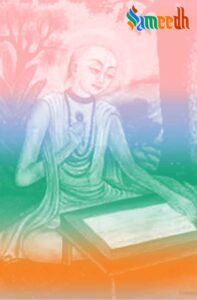Saint Jayadev was a renowned 12th-century Indian poet, composer, and saint known for his devotional works dedicated to Lord Krushna. He is most famous for his Sanskrit poem “Gita Govind,” which describes the love between Krushna and Radha.

Saint Jayadev was born in the 12th century in the village of Kenduli Sasan near Puri, in the state of Odisha, India. His exact birth date is uncertain, but he is traditionally believed to have been born in the early part of the century.
Jayadev was born to Kamalabai and Narayana Sastri, a devout Brahmin couple known for their piety. Kamalabai, deeply religious, yearned for a child and fervently prayed to the Lord for this blessing. One night, Lord Krushna appeared in a dream to Narayana Sastri, assuring him that Kamalabai’s prayers would be answered and they would soon be blessed with a remarkable son. Shortly thereafter, Kamalabai gave birth to Jayadev.
Life
From a young age, Jayadev was deeply devoted to Shri Krushna. His Upanayanam ceremony was performed when he was just five years old. He mastered the scriptures at an early age and was constantly absorbed in prayers to Shri Krushna.
He married Padmavati, a devout and talented dancer. Together, they often performed devotional rituals and compositions dedicated to Krushna. Jayadev served as a court poet in the kingdom of King Lakshmanasena of Bengal, where his literary and musical talents were highly regarded.
Works
One day, Jayadev experienced a divine vision that transported him into a state of ecstasy. In this vision, he saw the Yamuna River flowing through four Blue Mountains. Beside the riverbank, under a tree, Lord Shri Krushna was joyfully playing his flute. The sight of Krushna and the enchanting music so captivated Jayadev that he spontaneously composed a shloka. This moment marked the beginning of the famous epic, ‘Gita Govind’, perfectly illustrating the adage, ‘Poetry is a spontaneous overflow of powerful feelings and emotions’.
The most famous work of Jayadev is the “Gita Govind,” which consists of twelve cantos with twenty-four songs interspersed with narrative verses. Each song is composed of eight couplets, called “Ashtapadis,” which are sung in praise of the divine love between Radha and Krushna. The poem vividly depicts the various moods and emotions of Radha and Krushna, from longing and separation to joyous union.
The Dashavatara Stotram is a hymn composed by the celebrated 13th-century poet-saint Jayadev in his epic work, the Gita Govind. The poem is highly revered in Vaishnavism and is considered a masterpiece of Indian literature. Jayadev’s lyrical poetry and musical compositions have had a significant influence on Indian classical music and dance traditions, especially in the Odissi dance form.
Themes and Significance
The “Gita Govind” is renowned for its poetic beauty, emotional depth, and spiritual significance. It blends the themes of divine love and human passion, illustrating the bhakti (devotional) path to spiritual realization. The work has been translated into numerous languages and has inspired countless poets, musicians, and dancers across India and beyond.
Influence on Arts and Culture
Jayadev’s “Gita Govind” has had a profound impact on Indian classical arts. It has influenced the Odissi dance tradition, where the songs and verses of the poem are performed with intricate dance movements and expressions. The Ashtapadis are also integral to classical music, particularly in the Carnatic and Hindustani traditions.
Legacy
Saint Jayadev’s legacy continues to be celebrated in various cultural and religious contexts. His contributions to devotional literature and music remain timeless, and his works continue to inspire devotion and artistic expression.
